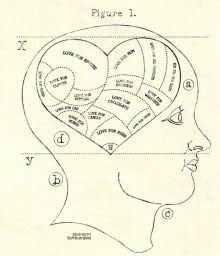Anyway, I found it when I was unpacking and cleaning the other day and I reread it yesterday. The "Why We Love" article discussed the usual "Men like women with a low waist to hip ratio and big boobs because they're signs of fertility" and "Women like men with deep voices and broad shoulders because that's indicative of high testosterone" and it talked about pheromones playing an important role in the choosing of a mate. I have heard most of this information in one form or another from watching The Discovery Channel and whatnot, but they said something that I haven't heard before, but makes a lot of sense.
Paraphrased:
There is a set of genes called the major histocompatibility complex (MHC) which influences tissue rejection. If a person tries to conceive a child with someone whose MHC is too similar to their own, and the risk increases that the womb will reject the pregnancy.
Studies show that lab mice can smell too-similar MHC in the urine of other mice and will avoid mating with those individuals. In later work (conducted at the University of Bern in Switzerland), human females were asked to smell t-shirts worn by anonymous males and then pick which ones appealed to them. Time and again, they chose the ones worn by men with a safely different MHC.
And if the smell of MHC can't get the job done, the taste will. Saliva also contains the compound, a fact that may partly explain the custom of kissing. Kissing might be a "taste test."
This is all well and good and interesting and, truly, makes a lot of sense. It's not that far from stuff I have heard before, but it hasn't ever been explained any further than "Smells have an effect on who we find attractive." In a very primitive (and practical) way, this explanation with the MHC explains why the smells work like they do.
This, I had not thought of, and I find to be very intriguing:
Precise as the MHC-detection system is, it can be confounded. One thing that throws us off the scent is the birth-control pill. Women who are on the Pill (which chemically simulates pregnancy) tend to choose wrong in the t-shirt test. When they discontinue the daily hormone dose, the protective smell mechanism kicks back in. "A colleague of mine wonders if the Pill may contribute to divorce," says chemist Charles Wysocki (of the Monell Chemical Sense Center in Philadelphia). "Women pick a husband when they're on birth control, then quit to have a baby and realize they've made a mistake."
Wow! Isn't that crazy? Sure gives you something to think about, huh?

Apologies. I couldn't find a higher resolution of that image. Like, one you can actually read...

1 comments:
These studies are pretty funny. But, the question remains:
How do they explain Woody Allen?
Post a Comment